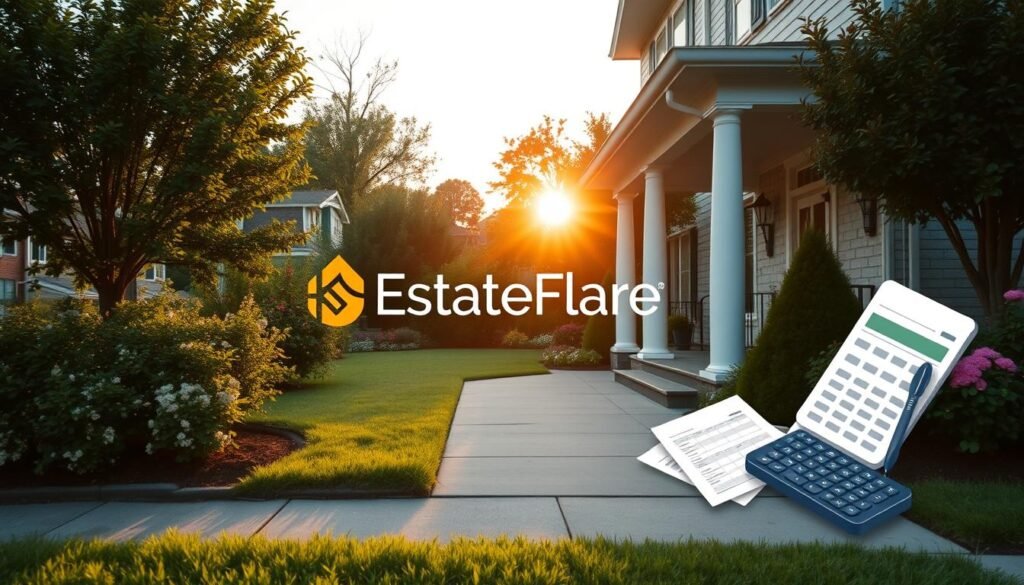In 2022, over 1.3 million U.S. properties faced foreclosure, a 34% jump from the previous year. This highlights the risks involved. We’ll explore foreclosure risks, causes, and solutions for both homeowners and investors.
Key Takeaways
- Foreclosures can offer opportunities for investors, but they also carry significant risks for homeowners.
- Understanding the factors behind mortgage delinquency and default rates is crucial in navigating the foreclosure process.
- Loan modifications and loss mitigation strategies can help homeowners avoid foreclosure and preserve their homes.
- Distressed properties can present potential investment opportunities, but buyers must carefully evaluate the risks involved.
- Foreclosure prevention programs and borrower assistance initiatives can provide a lifeline for struggling homeowners.
Understanding Foreclosures: A Comprehensive Guide
Foreclosures can be a complex and often daunting process for homeowners. In this guide, we’ll explore the intricacies of the foreclosure landscape. This includes the foreclosure process, relevant laws, and the various types of foreclosures that can occur.
The foreclosure process involves several stages. It starts with mortgage delinquency and progresses through default, notice of foreclosure, and the sale of the property. Understanding this timeline is crucial for homeowners facing financial difficulties.
It’s also essential to be aware of the foreclosure laws that govern this complex legal landscape. These laws vary by state. Homeowners must stay informed about the specific regulations in their area.
There are several foreclosure types, including judicial foreclosure, non-judicial foreclosure, and short sales. Each scenario has its own unique characteristics and implications for the homeowner. It’s vital to understand the differences.
“Staying informed and proactive is key when navigating the foreclosure process. Homeowners who understand their options and rights are better equipped to make informed decisions and potentially avoid the loss of their home.”
This comprehensive guide provides readers with the knowledge they need to navigate this challenging situation. It helps them make the best decisions for their financial future.
| Foreclosure Type | Description | Key Considerations |
|---|---|---|
| Judicial Foreclosure | Foreclosure process overseen by the court | Longer timeline, but court oversight can provide more protections for homeowners |
| Non-Judicial Foreclosure | Foreclosure process outside of the court system | Quicker process, but fewer homeowner protections |
| Short Sale | Sale of the home for less than the mortgage balance | Requires lender approval, can impact credit score |
Mortgage Delinquency: The Precursor to Foreclosure
It’s important to know why people fall behind on their mortgage payments. This can lead to foreclosure, affecting not just the homeowner but also the community. When people can’t make their mortgage payments on time, it’s a big problem.
Factors Contributing to Mortgage Delinquency
Several life events can cause mortgage delinquency. These include:
- Job loss or reduction in income
- Unexpected medical bills or expenses
- Divorce or other significant life changes
- Adjustable-rate mortgage resets, causing payments to increase
These financial shocks can make it hard for homeowners to pay their mortgage. This can lead to late payments and eventually, mortgage delinquency.
Consequences of Prolonged Delinquency
Mortgage delinquency has serious effects on homeowners. Late payments can hurt a homeowner’s credit score a lot. This makes it hard to get financing or even basic services in the future.
Long-term mortgage delinquency also raises the risk of foreclosure. This can lead to losing a home and more financial trouble.
“Mortgage delinquency is a precarious situation that can quickly spiral out of control, jeopardizing a homeowner’s financial stability and future.”
Understanding why mortgage delinquency happens and its effects can help. Homeowners can take steps to fix the issue. They might look into loan modifications or other help to avoid foreclosure.

Default Rates: A Barometer of Economic Health
Default rates are key to understanding the economy’s health. They show us how the housing market, consumer finances, and the economy are doing. By watching default rates, we learn about financial stability and make better economic choices.
Looking at default rates helps us see how the housing market is doing. High foreclosure rates mean the real estate market might be falling. This can lead to lower home prices and less investment. On the other hand, low default rates show a strong housing market, with people paying their mortgages and the economy doing well.
| Economic Indicator | 2020 | 2021 | 2022 |
|---|---|---|---|
| Default Rates | 6.32% | 4.89% | 3.75% |
| Foreclosure Trends | 1.8% | 1.2% | 0.9% |
| Housing Market Trends | Moderate Decline | Gradual Recovery | Steady Growth |
Default rates and the economy are linked in complex ways. High default rates can weaken the economy. This is because foreclosures and delinquent mortgages affect spending, investment, and confidence. But, a strong economy with steady jobs and income usually means lower default rates, as people can pay their mortgages.
“Default rates are a critical barometer of economic health, reflecting the financial well-being of both individual households and the broader community.”
By watching default rates and their ties to other economic signs, we get a full picture of the economy. This knowledge helps shape policies, investment plans, and guides consumers in their financial decisions.
Loan Modifications: A Potential Solution
For homeowners facing mortgage delinquency and foreclosure, loan modifications can be a help. These changes make the mortgage easier to handle. They might lower the interest rate, extend the loan term, or cut the principal balance.
Eligibility Criteria for Loan Modifications
To qualify for a loan modification, a few things are important:
- Hardship: You must show financial trouble, like job loss or medical bills, that makes paying the mortgage hard.
- Ability to Repay: Lenders check if you can afford the new mortgage payments based on your current finances.
- Loan-to-Value Ratio: This compares your mortgage balance to your home’s value. It’s key for getting approved.
Advantages and Disadvantages of Loan Modifications
Loan modifications have good points for both sides:
| Advantages | Disadvantages |
|---|---|
|
|
Loan modifications can really help prevent foreclosure and refinance mortgages. But, they work best when the borrower’s situation is right and the lender is willing to make good deals.

Loss Mitigation: Navigating the Foreclosure Process
Homeowners facing foreclosure need to understand loss mitigation. It’s about finding ways to lessen the financial and personal harm. Loss mitigation offers strategies and options to help borrowers.
The foreclosure process is long and stressful. But, with the right help, homeowners can find ways to keep their homes. The timeline varies by state and local laws. It includes steps like notice of default and the final sale.
- Alternatives like loan modifications and short sales can help. They offer options before foreclosure is final.
- Knowing the foreclosure process and loss mitigation strategies helps. It empowers homeowners to take action.
By focusing on loss mitigation, homeowners can find better solutions. This approach can help lessen the impact of foreclosure.
“The key to successful loss mitigation is to act quickly and explore all available options. With the right approach, homeowners can often find a way to stay in their homes or at least mitigate the financial impact of foreclosure.”
The foreclosure process is complex and emotionally tough. But, with the right knowledge and support, homeowners can overcome it. They can find the best outcome for their situation.
Distressed Properties: Opportunities and Pitfalls
In the real estate world, distressed properties are getting more attention. These include foreclosures, short sales, and REO properties. They come with challenges and potential rewards. We’ll help you find these opportunities and talk about the risks.
Identifying Distressed Properties
Finding distressed properties needs a sharp eye and market knowledge. Distressed properties show signs like long vacancies, neglect, or foreclosure notices. By keeping up with local markets and watching listings, you can find these hidden opportunities.
Risks Associated with Distressed Properties
Distressed properties can be good investments but also have risks. They might need a lot of repairs, have legal issues, or face ownership disputes. Dealing with the foreclosure process and costs can be tough. So, it’s key to do your homework and get expert advice.
“Investing in distressed properties is not for the faint of heart. It requires a deep understanding of the market, a willingness to take on risk, and a keen eye for identifying hidden value.”
With caution and a smart plan, you can find big chances in real estate. Whether you want to grow your investment properties or check out foreclosures and short sales, knowing this area well is vital. It helps you make smart choices and avoid problems.

Foreclosure Prevention: Strategies for Homeowners
Many homeowners face the scary thought of foreclosure as the housing market changes. But, there are ways to stop this and keep your home. We’ll look at loan modifications, forbearance, bankruptcy, and short sales as options.
Loan Modifications: Tailoring Your Mortgage
One good way to avoid foreclosure is through a loan modification. This means changing your mortgage terms with your lender. You might get a lower interest rate or longer to pay back the loan. This makes your monthly payments easier to handle.
Forbearance Agreements: Temporary Relief
Another choice is a forbearance agreement. It lets you pause or lower your mortgage payments for a while. This gives you time to get your finances sorted out. It’s not a permanent fix, but it can help you find a better solution.
Bankruptcy: A Last Resort?
In some cases, bankruptcy might be an option to stop foreclosure. It can help you reorganize your debt and get a break from foreclosure. But, it’s a big decision that can affect your credit and finances for a long time.
Short Sales: Avoiding Foreclosure
If other options fail, a short sale might be the best choice. You sell your home for less than what you owe, with the lender’s okay. This way, you avoid the bad effects of foreclosure on your credit and finances.
Dealing with foreclosure prevention can be tough, but with the right steps, you can protect your home. Look into these options and get help from experts. This way, you can keep your home and secure a better financial future.
| Strategy | Description | Pros | Cons |
|---|---|---|---|
| Loan Modification | Renegotiating mortgage terms with lender | Reduced monthly payments, extended repayment period | Requires lender approval, may have long-term impact on credit |
| Forbearance Agreement | Temporary suspension or reduction of mortgage payments | Provides breathing room to get finances in order | Only a temporary solution, must eventually resume full payments |
| Bankruptcy | Restructuring debt through bankruptcy proceedings | Temporary protection from foreclosure, opportunity to catch up on missed payments | Significant long-term impact on credit and financial well-being |
| Short Sale | Selling home for less than mortgage balance with lender approval | Avoids the negative impact of foreclosure on credit | Requires lender approval, may still have some financial consequences |
“Foreclosure prevention is a complex process, but with the right strategies and support, homeowners can take control of their financial future and preserve their most valuable asset.”
Borrower Assistance Programs: A Lifeline for Struggling Homeowners
Dealing with foreclosure can be tough, but there’s hope. Borrower assistance programs, both from the government and private lenders, help those at risk of losing their homes.
Let’s look at the different ways to help homeowners keep their homes and avoid foreclosure.
Government-Sponsored Borrower Assistance Programs
The government has set up programs to help homeowners in tough times. These programs offer help with mortgage payments, loan changes, and stopping foreclosure.
- Making Home Affordable (MHA) – This program helps with refinancing and loan changes to lower payments and prevent foreclosure.
- Hardest Hit Fund (HHF) – Helps homeowners in states hit hard by the housing crisis with mortgage payments, principal reduction, and foreclosure prevention.
- Federal Housing Administration (FHA) – Offers options like loan changes and partial claims to help homeowners avoid foreclosure.
Private Lender Borrower Assistance Programs
Private lenders also have programs to help homeowners in trouble.
- Loan Modification Programs – Private lenders may offer loan changes, like lower interest rates, to help homeowners get back on track.
- Forbearance Agreements – Lenders might give temporary breaks from mortgage payments to help homeowners deal with financial issues.
- Short Sale Assistance – Lenders can help with short sales, guiding homeowners to minimize foreclosure’s impact.
These programs can be a lifeline for homeowners facing foreclosure. They offer a chance to keep their homes and get back on their feet. By exploring these options, homeowners can take steps to navigate foreclosure challenges.

“These programs are a vital resource for homeowners in distress, providing a pathway to avoid the devastating consequences of foreclosure.”
| Program | Description | Eligibility Criteria |
|---|---|---|
| Making Home Affordable (MHA) | Offers loan refinancing and modifications to lower monthly payments | Homeowners with a mortgage owned or guaranteed by Fannie Mae or Freddie Mac |
| Hardest Hit Fund (HHF) | Provides targeted assistance for homeowners in states hit hardest by the housing crisis | Homeowners in specific states identified as having been significantly impacted by the housing crisis |
| FHA Loss Mitigation | Offers loan modifications and partial claims to help homeowners avoid foreclosure | Homeowners with an FHA-insured mortgage |
Home Retention Programs: Keeping a Roof Overhead
Home retention programs offer hope to homeowners facing foreclosure. These programs, from the government and private lenders, help homeowners keep their homes. They aim to prevent the harsh effects of foreclosure.
Government-Sponsored Home Retention Programs
The government has launched several programs to help homeowners. The Home Affordable Modification Program (HAMP) is one. It offers loan modifications for those in financial trouble. Homeowners can get lower payments, longer terms, and lower interest rates.
The Hardest Hit Fund is another government program. It helps homeowners in states severely affected by the housing crisis. This fund can be used for mortgage help, principal reduction, and more.
Private Lender Home Retention Programs
Private lenders also offer home retention programs. These include loan modifications, payment deferment, and forbearance. They help homeowners through tough financial times.
Some lenders also provide financial counseling. They help homeowners navigate the foreclosure process. This ensures they have support to explore all options.
| Program | Description | Eligibility Criteria |
|---|---|---|
| Home Affordable Modification Program (HAMP) | Offers loan modifications to reduce monthly payments | Homeowners experiencing financial hardship, meeting income and other requirements |
| Hardest Hit Fund | Provides targeted aid to homeowners in states hit hard by the housing crisis | Homeowners in eligible states, meeting income and other requirements |
| Private Lender Programs | Offer loan modifications, payment deferment, and forbearance options | Varies by lender, often based on financial hardship and eligibility |
Home retention programs help homeowners stay financially stable. They ensure a roof over their heads, even in tough times.
Auction Properties: Risks and Rewards
Exploring auction properties is both thrilling and challenging for real estate investors. These homes, often foreclosed or distressed, offer both chances and hurdles. It’s important to think them through carefully.
Understanding the Auction Process
The auction process for auction properties is different from regular real estate deals. Buyers need to be quick, often skipping detailed due diligence. Knowing the types of auctions and their rules is key to success in this market.
Evaluating Auction Properties
Figuring out the value and potential of auction properties needs a keen eye and careful planning. You must consider the property’s state, legal issues, who lives there, and its future. Investors who inspect and research well might find great deals. But, they also face big risks.
By grasping the auction process and doing thorough due diligence, smart real estate investors can find success in the foreclosure auctions market.

| Advantages of Auction Properties | Risks of Auction Properties |
|---|---|
|
|
“Buying a house at an auction involves understanding the financial risks and preparing yourself with research on the process and property condition.”
Foreclosure Risks: A Closer Look
Buying foreclosed properties can be profitable, but it comes with risks. One big worry is the financial impact of foreclosure. Homeowners in foreclosure often face financial trouble. This includes losing equity, extra fees, and damaged credit scores.
Financial Implications of Foreclosure
Foreclosure can hit homeowners hard. They might lose the equity they’ve built up. The foreclosure sale price can be less than the mortgage balance. Plus, there are legal fees and penalties that add to the financial burden.
Impact on Credit Scores and Future Borrowing
Foreclosure can really hurt a homeowner’s credit score. It stays on their credit report for up to seven years. This makes it hard to get loans or credit cards at good rates. It limits their ability to make big financial decisions.
To avoid these risks, investors should do their homework. They need to understand the financial and legal aspects of foreclosure. This way, they can make smart choices and avoid financial surprises.
First-time homebuyer: What are the advantages and aid for a first home purchase?
FIRST-TIME HOMEBUYER: WHAT ARE THE ADVANTAGES AND AID FOR A FIRST HOME PURCHASE?
Conclusion
The world of foreclosures is complex, with both good and bad sides. Homeowners, investors, and communities all face challenges. We’ve looked at how foreclosures start, the process, and the chances to find good deals.
The key takeaways from our overview are clear. It’s crucial to do your homework, plan your budget, and know your financial situation and goals. If you’re facing foreclosure, there are programs and strategies to help you stay in your home.
For those interested in the foreclosure market, the next steps are clear. You can start by looking at local listings, exploring loan modifications, or working with experts in distressed properties. By being informed and strategic, you can find opportunities while avoiding risks.



